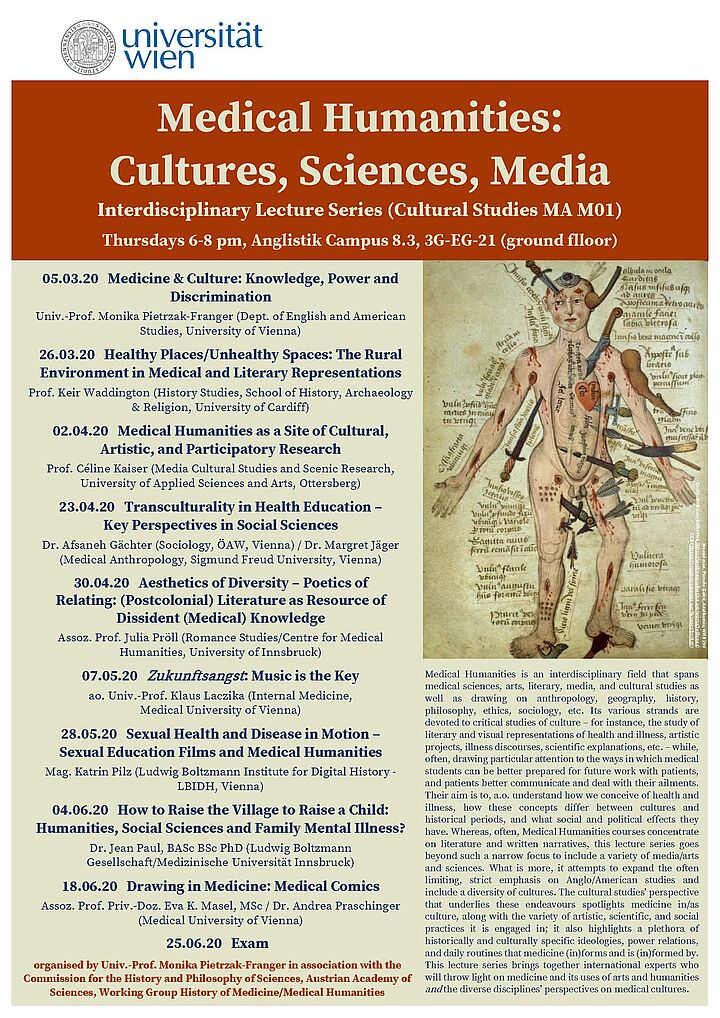Donnerstag, 18. Juni 2020, 18:00 - 20:00 iCal
Medical Humanities: Cultures, Sciences, Media
Please mark that we had to move online due to the Corona-Crisis. You can follow us on Twitter: #MedicalHumanitiesUnivie and @MedicalHumanities Uni Vienna
We are also working on opening some of the lectures for the general public. Please see our website for updates: anglistik.univie.ac.at/staff/staff/pietrzak-franger/medical-humanities/
Institut für Anglistik und Amerikanistik, Unterrichtsraum (3G-EG-21)
Spitalgasse 2, Hof 8.3, 1090 Wien
Lecture
Weitere Termine
Donnerstag, 05. M�rz 2020, 18:00 - 20:00
Donnerstag, 26. M�rz 2020, 18:00 - 20:00
Donnerstag, 02. April 2020, 18:00 - 20:00
Donnerstag, 23. April 2020, 18:00 - 20:00
Donnerstag, 30. April 2020, 18:00 - 20:00
Donnerstag, 07. Mai 2020, 18:00 - 20:00
Donnerstag, 28. Mai 2020, 18:00 - 20:00
Donnerstag, 04. Juni 2020, 18:00 - 20:00
In the midst of a pandemic of unprecedented scale, what is the role of Medical Humanities?
The Corona-outbreak touches on our most visceral fears, fears of our own mortality and bodily collapse. But it also evokes visions of social unrest, poses a potential threat to liberty, and sparks anxieties about economic breakdown. It, too, aggravates (global and local) social inequalities and raises a number of ethical questions - questions that fall outside the narrow scope of bio-medicine. This is where the humanities step in. With medical professionals doing overtime to attend to the sick, ethical and social problems remain largely unaddressed and tales of individual suffering remain untold. But diseases affect human beings. What is more: The way we talk about Corona matters. Our narratives have far-reaching consequences. Attending to the ways we conceptualise the virus, including those who suffer from it, and learning from the ways past societies have dealt with disease are among the most important challenges the Medical Humanities have to tackle right now.
Medical Humanities can try to provide answers to such questions like: What are the cultural, social, political, etc. effects of epidemics? How are pandemics linked to processes of globalization? What ethical and humanitarian issues do such crises throw into strong relief? What cultural practices are born in times like these? How can arts, media, literature, music etc. provide temporary relief? How can they help us come to terms with these developments?
Medical Humanities is an interdisciplinary field that spans medical sciences, arts, literary, media, and cultural studies as well as drawing on anthropology, geography, history, philosophy, ethics, sociology, etc. Its various strands are devoted to critical studies of culture, while, often, drawing particular attention to the ways in which medical students can be better prepared for future work with patients, and patients better communicate and deal with their ailments. Their aim is to, a.o. understand how we conceive of health and illness, how these concepts differ between cultures and historical periods, and what social and political effects they have. Whereas, often, Medical Humanities courses concentrate on literature and written narratives, this lecture series goes beyond such a narrow focus to include a variety of media/arts and sciences. What is more, it attempts to expand the often limiting, strict emphasis on Anglo/American studies and include a diversity of cultures. The cultural studies' perspective that underlies these endeavours spotlights medicine in/as culture, along with the variety of artistic, scientific, and social practices it is engaged in; it also highlights a plethora of historically and culturally specific ideologies, power relations, and daily routines that medicine (in)forms and is (in)formed by. This lecture series brings together experts who will throw light on medicine and its uses of arts and humanities and the diverse disciplines' perspectives on medical cultures.
05.03.20 "Medicine & Culture: Knowledge, Power and Discrimination"
Univ.-Prof. Monika Pietrzak-Franger (Dept. of English and American Studies, University of Vienna)
26.03.20 "Healthy Places/Unhealthy Spaces: The Rural Environment in Medical and Literary Representations"
Prof. Keir Waddington (History Studies, School of History, Archaeology & Religion, University of Cardiff)
02.04.20 "Medical Humanities as a Site of Cultural, Artistic, and Participatory Research"
Prof. Céline Kaiser (Media Cultural Studies and Scenic Research, University of Applied Sciences and Arts, Ottersberg)
23.04.20 "Transculturality in Health Education - Key Perspectives in Social Sciences"
Dr. Afsaneh Gächter (Sociology, ÖAW, Vienna) / Dr. Margret Jäger (Medical Anthropology, Sigmund Freud University, Vienna)
30.04.20 "Aesthetics of Diversity - Poetics of Relating: (Postcolonial) Literature as Resource of Dissident (Medical) Knowledge"
Assoz. Prof. Julia Pröll (Romance Studies/Centre for Medical Humanities, University of Innsbruck)
07.05.20 "Zukunftsangst: Music is the Key"
ao. Univ.-Prof. Klaus Laczika (Internal Medicine, Medical University of Vienna)
28.05.20 "Sexual Health and Disease in Motion - Sexual Education Films and Medical Humanities"
Mag. Katrin Pilz (Ludwig Boltzmann Institute for Digital History - LBIDH, Vienna)
04.06.20 "How to Raise the Village to Raise a Child: Humanities, Social Sciences and Family Mental Illness?"
Dr. Jean Paul, BASc BSc PhD (Ludwig Boltzmann Gesellschaft/Medizinische Universität Innsbruck)
18.06.20 "Drawing in Medicine: Medical Comics"
Assoz. Prof. Priv.-Doz. Eva K. Masel, MSc / Dr. Andrea Praschinger (Medical University of Vienna)
organised by Univ.-Prof. Monika Pietrzak-Franger in association with the Commission for the History and Philosophy of Sciences, Austrian Academy of Sciences, Working Group History of Medicine/Medical Humanities
Zur Webseite der Veranstaltung
Veranstalter
Institut für Anglistik und Amerikanistik
Kontakt
Univ.-Prof. Dr. Monika Pietrzak Franger / Ulrike Zillinger
Institut für Anglistik und Amerikanistik
01/4277-42481 / 01/4277-42450
monika.pietrzak-franger@univie.ac.at
Erstellt am Mittwoch, 08. April 2020, 15:54
Letzte Änderung am Dienstag, 26. Mai 2020, 09:49

